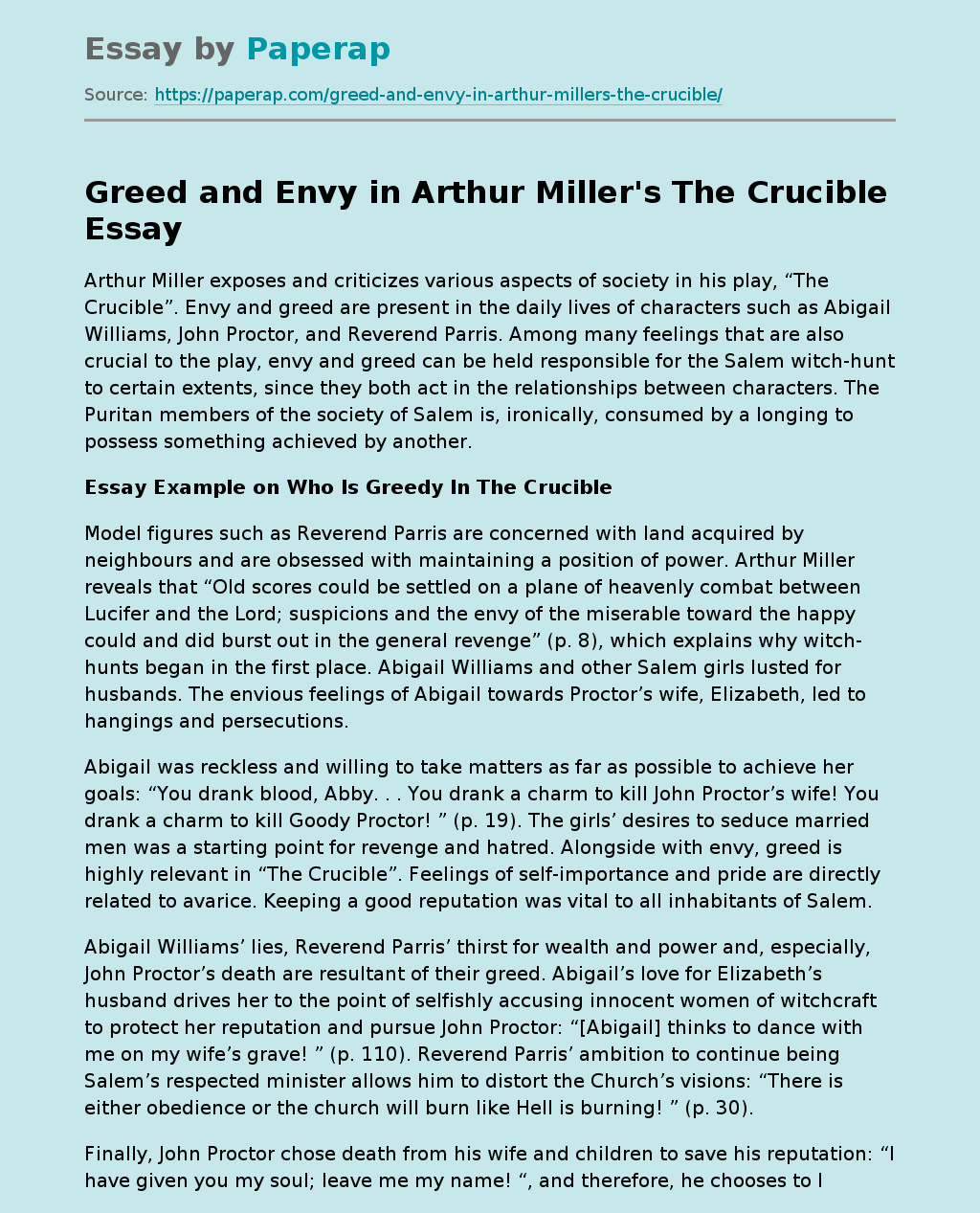Greed and Envy in Arthur Miller's The Crucible
Arthur Miller exposes and criticizes various aspects of society in his play, “The Crucible”. Envy and greed are present in the daily lives of characters such as Abigail Williams, John Proctor, and Reverend Parris. Among many feelings that are also crucial to the play, envy and greed can be held responsible for the Salem witch-hunt to certain extents, since they both act in the relationships between characters. The Puritan members of the society of Salem is, ironically, consumed by a longing to possess something achieved by another.
Essay Example on Who Is Greedy In The Crucible
Model figures such as Reverend Parris are concerned with land acquired by neighbours and are obsessed with maintaining a position of power. Arthur Miller reveals that “Old scores could be settled on a plane of heavenly combat between Lucifer and the Lord; suspicions and the envy of the miserable toward the happy could and did burst out in the general revenge” (p. 8), which explains why witch-hunts began in the first place.
Abigail Williams and other Salem girls lusted for husbands. The envious feelings of Abigail towards Proctor’s wife, Elizabeth, led to hangings and persecutions.
Abigail was reckless and willing to take matters as far as possible to achieve her goals: “You drank blood, Abby. . . You drank a charm to kill John Proctor’s wife! You drank a charm to kill Goody Proctor! ” (p. 19). The girls’ desires to seduce married men was a starting point for revenge and hatred. Alongside with envy, greed is highly relevant in “The Crucible”.
Feelings of self-importance and pride are directly related to avarice. Keeping a good reputation was vital to all inhabitants of Salem.
Abigail Williams’ lies, Reverend Parris’ thirst for wealth and power and, especially, John Proctor’s death are resultant of their greed. Abigail’s love for Elizabeth’s husband drives her to the point of selfishly accusing innocent women of witchcraft to protect her reputation and pursue John Proctor: “[Abigail] thinks to dance with me on my wife’s grave! ” (p. 110). Reverend Parris’ ambition to continue being Salem’s respected minister allows him to distort the Church’s visions: “There is either obedience or the church will burn like Hell is burning! ” (p. 30).
Finally, John Proctor chose death from his wife and children to save his reputation: “I have given you my soul; leave me my name! “, and therefore, he chooses to leave his name intact and die as a tragic hero. It may be said that envy and greed were responsible for the chaos of witch-hunt, however, they cannot fully be blamed. Other feelings such as fear, pride, and honour are common to those of a restricted society like Salem and can be more responsible for the havoc. The former emotions affect the society of Salem as a whole, unlike greed and envy that affect some characters personally.
Consequently, it is reasonable to say that the causes for the Salem witch-hunt varies according to each reader. One may strongly discuss that envy and greed were responsible for chaos in Salem while another can, just as strongly, defend his opinion that fear and pride, for example, are mostly to blame. All in all, evidence and examples show that envy and greed can be held responsible for the Salem witch-hunt to certain extents. These feelings may not be the main principles to blame but are, nonetheless, present in “The Crucible” and do influence some characters, aggravating the already turbulent society of Salem.
Greed and Envy in Arthur Miller's The Crucible. (2019, Nov 27). Retrieved from https://paperap.com/greed-and-envy-in-arthur-millers-the-crucible/

